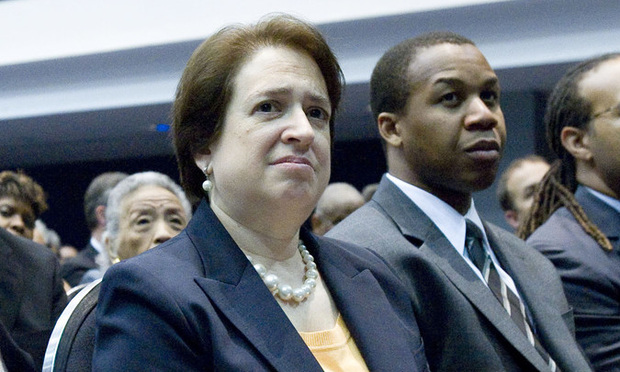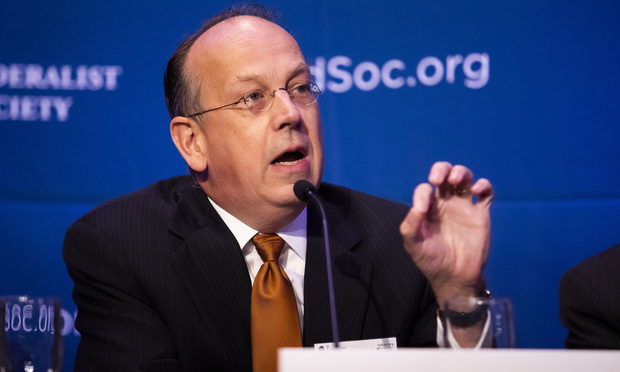Kagan Writes Stinging Dissent as Court Sidesteps Politically Rigged Election Maps
"Of all times to abandon the court's duty to declare the law, this was not the one," Justice Elena Kagan wrote in her dissent, which she summarized from the bench Thursday.
June 27, 2019 at 11:41 AM
7 minute read
 Justice Elena Kagan. (Photo: Diego M. Radzinschi / ALM)
Justice Elena Kagan. (Photo: Diego M. Radzinschi / ALM)
The U.S. Supreme Court's refusal Thursday to cabin extreme partisan gerrymanders revealed a deep division between Chief Justice John Roberts Jr. and Justice Elena Kagan over the duty of the justices to resolve an issue affecting what one justice has called “the precious right to vote.”
Federal courts have no authority to resolve disputes involving the influence partisanship plays in setting election-map boundaries, a sharply divided high court said in two cases challenging partisanship in redistricting.
The high court decision, written by Chief Justice John Roberts Jr., drew a stinging and lengthy rebuke from Justice Elena Kagan, who wrote a dissent that was joined by justices Ruth Bader Ginsburg, Stephen Breyer and Sonia Sotomayor.
“Of all times to abandon the court's duty to declare the law, this was not the one,” Kagan, who summarized her dissent from the bench, wrote in her dissent. “The practices challenged in these cases imperil our system of government. Part of the court's role in that system is to defend its foundations. None is more important than free and fair elections. With respect but deep sadness, I dissent.”
The opinions written by Roberts and Kagan could not have been more different in style and tone. Roberts, in a workmanlike approach, examined each area of the Constitution and court precedents in search of a manageable standard that courts could use to measure when partisanship in redistricting went so far as to violate the Constitution. Kagan, in a magisterial approach to the duty and role of the court, countered Roberts with how district courts across the country have found standards to use.
“For the first time ever, this court refuses to remedy a constitutional violation because it thinks the task beyond judicial capabilities,” Kagan wrote. “If left unchecked, gerrymanders like the ones here may irreparably damage our system of government.”
But Roberts, sensitive to Kagan's rebuke, rejoined that the dissenters were seeking an “unprecedented expansion of judicial power.” He added: “No one can accuse this Court of having a crabbed view of the reach of its competence. But we have no commission to allocate political power and influence in the absence of a constitutional directive or legal standards to guide us in the exercise of such authority.”
 U.S. Chief Justice John Roberts Jr. (Photo: Diego M. Radzinschi / ALM)
U.S. Chief Justice John Roberts Jr. (Photo: Diego M. Radzinschi / ALM)This term's challenges to partisan gerrymandering and a citizenship question on the 2020 census—which the court blocked on Thursday—were viewed by many as the most important political cases before the high court in recent times because of their potential impact on the nation's representative democracy. The court has long struggled with where and how to draw a line to limit partisan gerrymandering.
For the second time in just one year, the justices had found themselves struggling in two cases with whether and how to measure when partisanship so infects redistricting that the process violates the Constitution. In 2018, in cases from Wisconsin and Maryland, the high court did not rule on the merits of the claims by challengers to those states' maps.
The justices sent the Wisconsin case—Gill v. Whitford—back to the lower court to see if the challengers to the state's Republican-drawn legislative map could establish standing to sue. And in the Maryland case—Benisek v. Lamone—they held that the challenge to the drawing of the 6th Congressional District by the Democratic-controlled General Assembly was still in its early stages.
This term, the Maryland case, now styled Lamone v. Benisek, returned to the high court after the district court ruled for the plaintiffs and ordered the state to draw a new map for next year's elections.
The second case, Rucho v. Common Cause, consolidated with Rucho v. League of Women Voters, arose out of North Carolina's Republican-controlled General Assembly's intentional drawing of district lines to preserve its 10-3 dominance of the state's congressional delegation even though Republicans captured just 53 percent of the statewide vote in 2016. A three-judge district court said the map was an impermissible partisan gerrymander.
 Paul Clement, speaking at the Federalist Society's 7th Annual Executive Branch Review Conference on May 8, 2019. (Photo: Diego M. Radzinschi/ ALM)
Paul Clement, speaking at the Federalist Society's 7th Annual Executive Branch Review Conference on May 8, 2019. (Photo: Diego M. Radzinschi/ ALM)During more than two hours of arguments in March, the high court appeared as divided as it was a year ago on whether partisan gerrymander claims should be heard by the courts and, if they should be, whether there existed a workable standard for determining unconstitutional partisanship.
Kirkland & Ellis partner Paul Clement, counsel to North Carolina Republican legislators, argued there was no role for the courts. The Constitution, he told the justices, gives state legislatures the responsibility for drawing district lines, with oversight by Congress.
Clement's arguments seemed to attract Justice Neil Gorsuch who suggested some states were moving to address the problem by enacting independent redistricting commissions. Gorsuch also noted that the U.S. House of Representatives had passed H.R. 1, which contains a provision mandating those commissions. That bill has stalled in the Republican-controlled Senate.
Kagan did not appear persuaded that the states themselves would solve the problem of excessive partisanship.
In the North Carolina case, she pointed out, the challengers offered more than 24,000 potential redistricting maps, and 99% showed that the 10-3 configuration was not the natural one. “It's just not the way anyone can district given the actual political geography on the ground, unless you absolutely try to overrule that political geography,” she said.
The Maryland challengers, represented by Michael Kimberly, now a partner at McDermott Will & Emery, claimed the redrawing of the 6th Congressional District to favor Democrats was retaliation against Republican voters in violation of the First Amendment. Chief Justice John Roberts Jr. seemed sympathetic to that argument. Even though the theory had never been applied in the redistricting context, Roberts said he didn't see why it couldn't apply.
Emmet Bondurant of Atlanta's Bondurant, Mixson & Elmore argued for the challengers to the North Carolina plan, and he shared argument time with Allison Riggs of the Southern Coalition for Social Justice. In the Maryland case, Maryland Solicitor General Steven Sullivan argued against Kimberly.
Read more:
Justices, Blocking Citizenship Question on Census, Call Trump's Push 'Contrived'
Kagan, Gorsuch Show Divide Over Rigged Electoral Maps
Sen. Whitehouse: There's a 'Crisis of Credibility' at the US Supreme Court
A Mayer Brown Supreme Court Duo Leaps to McDermott
Justices Skirt Conclusive Ruling in Wisconsin Partisan Gerrymandering Case
This content has been archived. It is available through our partners, LexisNexis® and Bloomberg Law.
To view this content, please continue to their sites.
Not a Lexis Subscriber?
Subscribe Now
Not a Bloomberg Law Subscriber?
Subscribe Now
NOT FOR REPRINT
© 2025 ALM Global, LLC, All Rights Reserved. Request academic re-use from www.copyright.com. All other uses, submit a request to [email protected]. For more information visit Asset & Logo Licensing.
You Might Like
View All

DC Circuit Revives Firefighters' Religious Freedom Litigation in Facial Hair Policy Row
3 minute read
Federal Judge Pauses Trump Funding Freeze as Democratic AGs Plan Suit
4 minute read
4th Circuit Upholds Virginia Law Restricting Online Court Records Access
3 minute readTrending Stories
- 1Law Firms Expand Scope of Immigration Expertise, Amid Blitz of Trump Orders
- 2Latest Boutique Combination in Florida Continues Am Law 200 Merger Activity
- 3Sarno da Costa D’Aniello Maceri LLC Announces Addition of New Office in Eatontown, NJ, and Named Partner
- 4Friday Newspaper
- 5Public Notices/Calendars
Who Got The Work
J. Brugh Lower of Gibbons has entered an appearance for industrial equipment supplier Devco Corporation in a pending trademark infringement lawsuit. The suit, accusing the defendant of selling knock-off Graco products, was filed Dec. 18 in New Jersey District Court by Rivkin Radler on behalf of Graco Inc. and Graco Minnesota. The case, assigned to U.S. District Judge Zahid N. Quraishi, is 3:24-cv-11294, Graco Inc. et al v. Devco Corporation.
Who Got The Work
Rebecca Maller-Stein and Kent A. Yalowitz of Arnold & Porter Kaye Scholer have entered their appearances for Hanaco Venture Capital and its executives, Lior Prosor and David Frankel, in a pending securities lawsuit. The action, filed on Dec. 24 in New York Southern District Court by Zell, Aron & Co. on behalf of Goldeneye Advisors, accuses the defendants of negligently and fraudulently managing the plaintiff's $1 million investment. The case, assigned to U.S. District Judge Vernon S. Broderick, is 1:24-cv-09918, Goldeneye Advisors, LLC v. Hanaco Venture Capital, Ltd. et al.
Who Got The Work
Attorneys from A&O Shearman has stepped in as defense counsel for Toronto-Dominion Bank and other defendants in a pending securities class action. The suit, filed Dec. 11 in New York Southern District Court by Bleichmar Fonti & Auld, accuses the defendants of concealing the bank's 'pervasive' deficiencies in regards to its compliance with the Bank Secrecy Act and the quality of its anti-money laundering controls. The case, assigned to U.S. District Judge Arun Subramanian, is 1:24-cv-09445, Gonzalez v. The Toronto-Dominion Bank et al.
Who Got The Work
Crown Castle International, a Pennsylvania company providing shared communications infrastructure, has turned to Luke D. Wolf of Gordon Rees Scully Mansukhani to fend off a pending breach-of-contract lawsuit. The court action, filed Nov. 25 in Michigan Eastern District Court by Hooper Hathaway PC on behalf of The Town Residences LLC, accuses Crown Castle of failing to transfer approximately $30,000 in utility payments from T-Mobile in breach of a roof-top lease and assignment agreement. The case, assigned to U.S. District Judge Susan K. Declercq, is 2:24-cv-13131, The Town Residences LLC v. T-Mobile US, Inc. et al.
Who Got The Work
Wilfred P. Coronato and Daniel M. Schwartz of McCarter & English have stepped in as defense counsel to Electrolux Home Products Inc. in a pending product liability lawsuit. The court action, filed Nov. 26 in New York Eastern District Court by Poulos Lopiccolo PC and Nagel Rice LLP on behalf of David Stern, alleges that the defendant's refrigerators’ drawers and shelving repeatedly break and fall apart within months after purchase. The case, assigned to U.S. District Judge Joan M. Azrack, is 2:24-cv-08204, Stern v. Electrolux Home Products, Inc.
Featured Firms
Law Offices of Gary Martin Hays & Associates, P.C.
(470) 294-1674
Law Offices of Mark E. Salomone
(857) 444-6468
Smith & Hassler
(713) 739-1250








